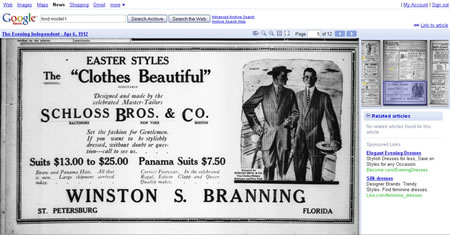The days of having to rely on newspapers’ online archives or, heaven forfend, actual physical archives in libraries, will soon be over.
Today, we’re launching an initiative to make more old newspapers accessible and searchable online by partnering with newspaper publishers to digitize millions of pages of news archives. Let’s say you want to learn more about the landing on the Moon. Try a search for [Americans walk on moon], and you’ll be able to find and read an original article from a 1969 edition of the Pittsburgh Post-Gazette.
Not only will you be able to search these newspapers, you’ll also be able to browse through them exactly as they were printed — photographs, headlines, articles, advertisements and all.
That’s a major deal right there. Even the big papers with extensive archives available online don’t offer the full print experience. For pop culture fans, that’s a barely explored treasure trove of information at their fingerprints.
I haven’t quite gotten the hang of how to scare up the good stuff. They seem to be starting with major events (the moon landing and the discovery of the wreck of the Titanic, for instance), but the blog entry also links to full issues of old papers turned up after a search for “Ford Model T.”
(That particular paper, incidentally, is the April 6,1912 edition of The Evening Independent, which covers the filling passenger rolls for Titanic’s maiden voyage, Taft’s likely nomination, a flood in Tennessee and an anthracite miners’ strike in Philadelphia.)
I want to see Victorian ads for some quack medicine or vibrators called Electromatic Hysteria Theraputalyzers, dammit!

Wow, you and your reader Kris have this thing about weird old ads.
I can remember sneezing my way through the college library’s stacks of bound periodicals. Let’s hope that thrill of discovery when you DID find what you were looking for still comes across in the computerized searches.
I have a hopeless thing for old ads, this is true. 😀
I think the sense of satisfaction can’t help but be diminished when the job is so much easier. Still, there’s a whole new sense of fulfillment to be found in having complete access to such an amazing breadth of periodicals.
On one hand, I love this. The accessibility makes a huge difference to we’ll think — how we can think — about the history of the media, the history of public attitudes, and… just plain old history.
On the other hand, the “frail slips of paper”, fakeable but not easily revised wholesale, a crucial ingredient in the reliability of our records. I have not just a fondness for them, but an epistemic respect for them that translates into concern about trends that make them seem dispensable…
There was a memory hole in the opposite wall. O’Brien lifted the grating. Unseen, the frail slip of paper was whirling away on the current of warm air; it was vanishing in a flash of flame. O’Brien turned away from the wall.
‘Ashes,’ he said. ‘Not even identifiable ashes. Dust. It does not
exist. It never existed.’
‘But it did exist! It does exist! It exists in memory. I remember it.
You remember it.’
‘I do not remember it,’ said O’Brien.
…
O’Brien was looking down at him speculatively. More than ever he had the air of a teacher taking pains with a wayward but promising child.
‘There is a Party slogan dealing with the control of the past,’ he
said. ‘Repeat it, if you please.’
‘”Who controls the past controls the future: who controls the present
controls the past,”‘ repeated Winston obediently.
Most excellent point. Certainly online images are far more falsifiable than old school archiving media like microfilm or fiche, and nothing at all beats an original.
I would hope newspapers and libraries wouldn’t see Google’s archives as a reason to destroy their hard copies, but realistically, periodicals take up a lot of room and their preservation is no negligible task. They might well choose to give up on the originals.
I admit that I will probably use this all the time, but part of me still wants the library archive. I feel that too much of our history is going “into the cloud.” I worry what kind of resources historians of the future will use to understand our time.
A reasonable concern indeed. On the other hand, I read an essay a few years back (before the internet explosion but after the pc explosion) by a historian lamenting the loss of contemporary primary sources.
He was concerned that despite being the most documented society since we came down from the trees, we have so much of our data stored on instantly obsolete media (punch cards, anyone?) that future historians are going to have to be Mad Max-like technicians to rig up devices that can read the data.
Internet archiving solves that problem in one fell swoop.